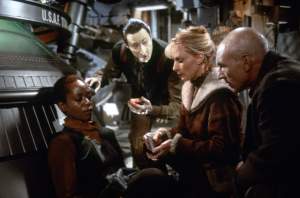The Artist

kamwatka/moviestillsdb
When was the last time you thought about The Artist?
It was quite in vogue for a time to make jokes about how Avatar was the biggest box office smash in movie history while also having no lasting cultural impact. That’s obviously a bunch of nonsense, but The Artist may be the most critically acclaimed film in history to then completely vanish from the face of the Earth.
Perhaps it’s the black-and-white photography? Or that it is a mainly silent film? The film is great for cinephiles — a celebration of pre-”talkie” cinema — but other than as a curio it has little lasting utility.
American Beauty

fpfan/moviestillsdb
Right up top, it’s worth pointing out that the recent horrifically negative developments in the reputation of Kevin Spacey are not the only reason for the massive critical reevaluation of director Sam Mendes’ 1999 dramedy. They haven’t helped any, but there’s more to it than that. Perhaps it was that it was so critically overrated that the backlash came so fast and hard.
The film doesn’t entirely deserve the way it has been dragged through the mud for the better part of two decades, but it at least makes sense. In a modern context, it might be hard to see the value of a film about a comfortable middle-class white man dealing with his mid-life crisis. Regardless, it’s one of the weakest best-picture winners of the bunch.
Chariots of Fire

captainot/moviestillsdb
The biggest red mark against Chariots of Fire is that it won Best Picture the same year that Raiders of the Lost Ark was nominated. It isn’t the film’s fault, but it’s still a fact that boggles the mind.
The way the film explores themes of competition and spiritualism, and how it addresses the antisemitism present at the University of Cambridge in the 1920s are all solid. Unfortunately, for a film about runners, the movie moves like a jogger with shin splints.
The film’s lasting impact is the Oscar-winning electronic score by Vangelis. Even if you think you’ve never heard it, you have.
Million Dollar Baby

butchielad/moviestillsdb
Clint Eastwood is one of the most prolific filmmakers of his or any generation, consistently churning out Academy Award-nominated films five or six times a decade. In retrospect, looking over his impressive filmography, it is peculiar that Million Dollar Baby was the one that won him the big prize. That isn’t to say that it is a bad film, but outside of its shocking, absolutely bleak ending it is one of Eastwood’s most boilerplate.
The performances are incredible, the writing is strong, and Eastwod’s direction is as confident as ever. But the whole thing adds up to a miserable, muddled experience.
Green Book

nicky/moviestillsdb
Green Book is the story of an African-American pianist touring the Deep South in the 1960s, and the unlikely friendship he forms with his white driver and bodyguard. And wouldn’t you know it, that white man learns a thing or two about institutional racism along the way? The problem here is that even as the film confronts the racial tensions of the era, it does so in a way that is both cliched and completely toothless.
You could understand if this film had picked up an Oscar in the 80s or 90s, but in 2018 it just reinforced the ideas people have about the nature of “Oscar bait” and the thought process behind Academy voters.
Tom Jones

captainot/moviestillsdb
No, this isn’t a biopic about the Welsh-born baritone who sang hits like “Sex Bomb” and “What’s New Pussycat?”
The film Tom Jones was an adaptation of a 1749 novel, starring Albert Finney and directed by Tony Richardson. Though it’s billed as a comedy and there are indeed some big laughs, there’s little for a modern viewer to grasp onto. There are several superlative performances, but they are attached to incredibly shallow characters, and the film feels more like a collection of unrelated scenes than it does a cohesive narrative. There are also stylistic flourishes common in British filmmaking of the 1960s that are borderline off-putting today.
Out of Africa

moviestillsdb
On paper, it should be a surprise to absolutely no one that Out of Africa got the attention of Academy voters. Based on a novel, it’s an epic period romance starring two of Hollywood’s brightest stars Robert Redford and Meryl Streep, and guided by the sure hand of Director Sydney Pollack.
Unfortunately, films do not exist on paper and we have to watch them.
Redford and Streep are individually great, yet they lack any kind of spark when they share the screen. Since the flaccid romance is meant to drive the narrative, the film amounts to a 161-minute chore.
Shakespeare in Love

zayne/moviestillsdb
Shakespeare in Love is a perfectly fine romantic comedy. The leads are pretty and have great chemistry, the script is witty and brave enough to not get bogged down by bothering to be historically accurate, and the supporting cast is a Harry Potter-esque who’s who of British thespians. The whole thing is obviously the right kind of charming, lovely cotton candy confection that general audiences go crazy for at the box office.
How on Earth did this film win Best Picture?
Particularly when Saving Private Ryan, The Thin Red Line, The Truman Show, Gods and Monsters, American History X, Elizabeth, Out of Sight, and Babe: Pig in the City were all released the same year?
Around the World in 80 Days

hilts/moviestillsdb
Fun fact, Michael Anderson’s Around the World in 80 Days got its name because that’s how long the runtime feels when you sit down and watch it.
Based on the Jules Verne novel of the same name, all 182 minutes of the film follow the fantastical adventure of Phileas Fogg, an English gentleman of the late 1800s who makes a wager that he can circumnavigate the globe in a certain amount of days (we’ll let you guess how many). The film is packed full of cameos and set pieces and diversions… and on and on it goes.
It doesn’t feel like a Best Picture, but rather the Most Picture.
Crash

andrewz/moviestillsdb
Perhaps we can all agree to just pretend like this Best Picture award went to David Cronenberg’s 1996 Crash and not to the 2004 film of the same name. Paul Haggis’ overwrought crime melodrama has become an Oscar punchline in the years following the 78th Academy Award, and rightfully so. It’s a shallow, tone-deaf, and borderline racist exploration of race and multiculturalism in 2004 Los Angeles and represents the kind of neoliberal thinking that better films like Get Out would later go on to critique.
Other films on this list are “bad movies that won Best Picture.”
Crash is just a bad movie.







